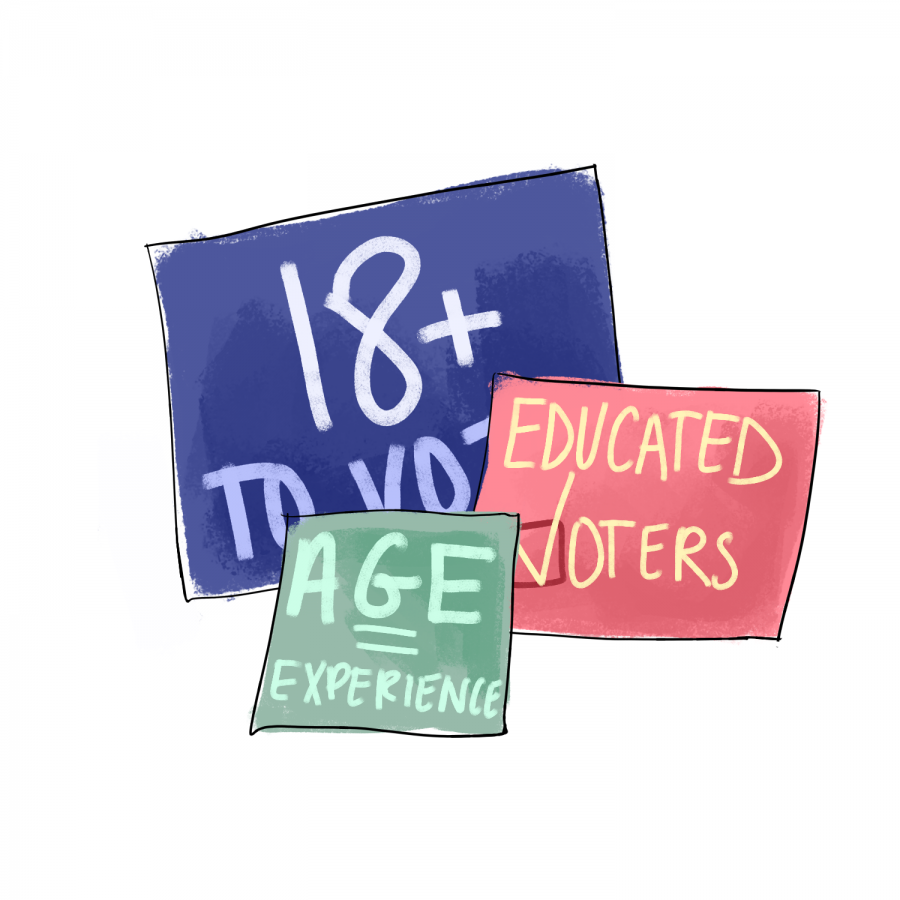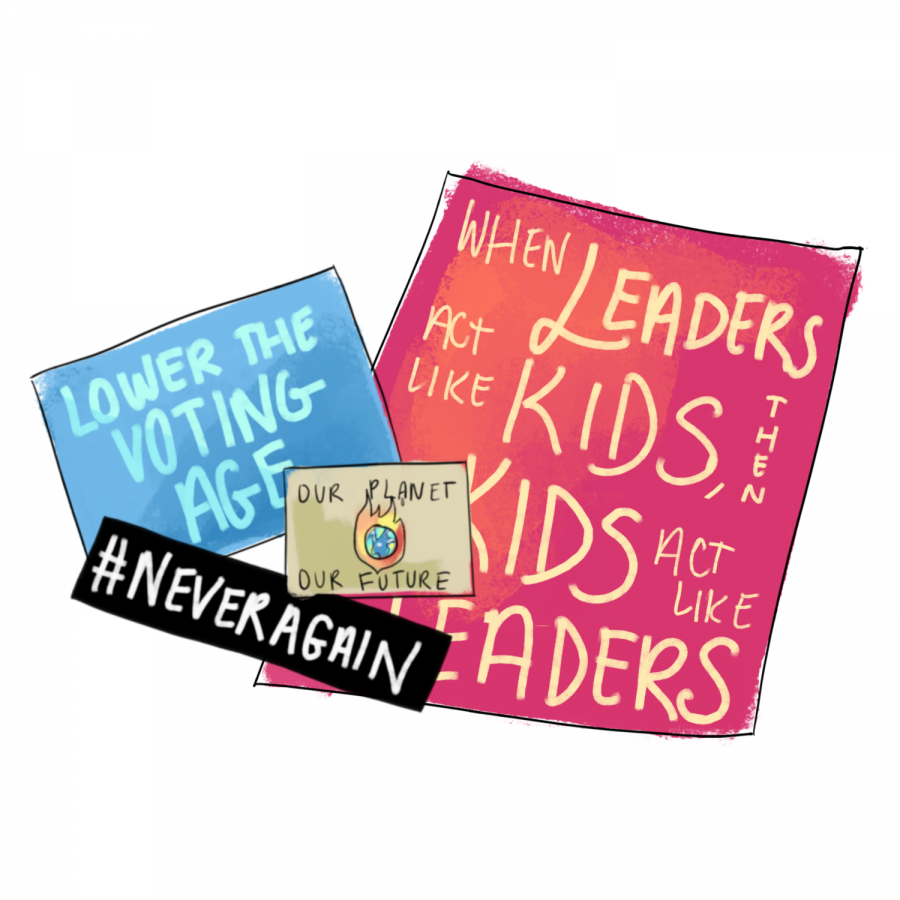B&G: Should the voting age in America be lowered?
November 2, 2020
In the age of Donald Trump, many students and teenagers have become much more politically active. From the survivors of the Parkland school shooting to teen activists participating in the Black Lives Matter movement, young people across the country are using their voice. This has sparked a debate on whether or not the voting age should be lowered. Some say yes, citing these activists, but others claim the vast majority of minors between the ages of 16 and 17 don’t have the political knowledge to cast serious votes. Read the following articles to understand the perspective of both sides.
Not all young people can be trusted with the immense responsibility of voting
Minors can not be trusted with the responsibility of voting. The voting age should remain at 18.
In 1971, the 26th Amendment lowered the U.S. voting age from 21 to 18 years old. Based largely on the work of young activists, some people are pushing for the voting age to be lowered once again to 16. Many people reason that this handful of young activists reflects the political competence of all the nation’s youth, however, when considering the political knowledge and maturity of the average minor teenager, it is clear that this group should not have the right to vote.
The main issue when discussing the minimum voting age is how informed minors are on current issues and candidates. While some teens may be well informed and mature enough to vote, many are not. Junior Elizabeth Mai said, “Because of the environment I grew up in, I would say I’m more informed than the current average voter … [but] the average person my age probably isn’t well informed.”
For many people, their knowledge of U.S. politics is limited to what they learned in their high school government class. While some go on to learn more in college or through their life experience as an adult, teenagers have not yet had that opportunity. Public schools do not teach important life skills such as how to file taxes or apply for jobs, and voting is no exception. While students learn the ins and outs of government procedure, they are not taught how to register to vote, mail in an absentee ballot, or research candidates. The practical aspects of preparing students to participate in a democracy are all too often ignored.
While many teachers supplement the curriculum with lessons on modern politics, class discussions often avoid topics that can become too controversial. Mai said, “School provides a good basic understanding of how government works, but it doesn’t really talk about current politics as much. It depends on your teachers, but most public education doesn’t really cover modern politics.” Young voters are forced to turn to outside resources of varying credibility to learn which candidates best represent their views, leading to great confusion. Lowering the voting age would only make this phenomenon more widespread.
While voters of any age can be affected by misinformation, this would be amplified in young and less mature voters. Government teacher Jonathan Taylor said, “I think it’s hard to give an across the board answer. I think some young people are mature enough and well informed certainly to participate in the democratic process. And other young people either aren’t necessarily ready or interested. I think it really just depends.” Due to the extreme disparities in political readiness across the nation, it is irresponsible to grant an entire group such a heavy responsibility.
Advocates often cite young activism as a justification to lower the voting age, but they fail to consider the impact of this activism itself. Lobbying, protests, social media campaigns and other forms of activism are vital ways of affecting government policy regardless of age, despite the fact that it may feel less direct or effective. Taylor said, “I wouldn’t say it’s less important, it’s equally important. It’s great to see kids invested and involved and [who] want to make their mark and get fellow classmates and friends interested as well. It’s very energizing to see.”
Richard Montgomery in particular has a strong culture of this student activism. Many students participated in protests surrounding the death of George Floyd and the recent Black Lives Matter movement. There has even been a push from students to change the name of the school to honor someone other than Richard Montgomery, who was a slave owner.
Many believe that young people, such as RM students, would have a large impact on elections but that is not necessarily true. Mai said, “If you were to let underage people, people who can’t vote, vote, I think it wouldn’t have that big of an impact, not enough. You would still need to influence other voters.” Voting is an important way of participating in the democratic process but it is not the only way, and being unable to vote is not preventing young people from making a difference.
Another argument for lowering the voting age is that it would result in a more consistent voting base since it would normalize exercising one’s civic duties during their developing years. However, according to the New York Times, increased political participation stems from witnessing your parents vote, participating in political discussions at home and participating in political activities. The habit of voting is formed from the environment one was raised in, regardless of whether or not they have the ability to vote.
While the consequences of lowering the voting age may not be detrimental to the state of the nation, the benefits of doing so are not dramatic enough to initiate this change. For the few 16 and 17 year-olds that actively participate in activism, they already have the effective platforms of advocacy and protests to get their voices heard, so voting does not necessarily create the change they are seeking. There are many other issues facing the U.S., and fighting for minors to be able to vote is a waste of effort when they will gain the right in two years.
Minors should have a say in the politics that govern their lives
The voting age should be lowered to allow 16 and 17 year-olds to participate in politics.
Imagine if someone’s rights and privileges were restricted based solely on the public’s perception of that person. This is not a hypothetical, but a current reality for millions in the United States. 16 and 17 year-olds are growing increasingly politically active and are perfectly capable of voting maturely, yet they are barred from doing so due to outdated and inaccurate societal stereotypes. Just 50 years ago, 18-year-olds found themselves in the same situation and we need to replicate the change.
During World War II, Franklin D. Roosevelt lowered the drafting age from 21 to 18 due to the increased role of the U.S. in the conflict. However, the voting age stayed put at 21 years old, meaning thousands of Americans were being shipped off to fight without a say in the nation’s government. These men, who risked their lives for the safety of the nation, felt they were victims of an unequal relationship with the government and fought for the right to vote to have some control over themselves. The rallying cry of “Old enough to fight, old enough to vote,” reverberated across America, and after 30 years and two other wars, the voting age was lowered to 18.
In 1970, Americans realized that sending unrepresented people to fight was morally wrong and were willing to pass an entirely new amendment. Today, 16 and 17 year-olds also have restricted influence in government when many of the decisions that are being made, such as those related to climate change, will affect their generation for decades to come. The country must acknowledge this as they did before and expand voting rights. And while a handful of Congress members, recently led by Ayanna Pressley, have suggested lowering the voting age, there is never enough traction built up despite the evidence suggesting it will benefit the nation.
The refusal to change is partly because many adults typically perceive 16 and 17 year-olds as impulsive and untrustworthy. Freshman Sami Saeed said, “There would need to be a system to educate them before they vote to ensure they know what they’re voting on.” However, countless teens have demonstrated over the past decade that their age group is becoming increasingly responsible and politically educated through protest and activism.
Teens like Alfonso Calderman call for gun control, give speeches and lobby for new laws. Teens like Greta Thunberg voice their opinions on climate change and fuel a worldwide movement in the process. Teens like Malala Yousafzai, change the world by putting their lives on the line to fight for equal education. Time and time again, these young activists show that they are willing to speak their minds and make decisions about what they feel is right, yet adults still think they will be irresponsible with voting.
Not only are these minors willing to do what is right, but they are also able to make educated decisions. Research conducted by Vote16usa showed “cold cognition,” a person’s ability to make well-reasoned decisions, matures at the age of 16. Voting only requires being able to research the candidates and choose who will lead the country better, and 16 and 17 year-olds are more than capable of doing this.
The fact that this group is unable to vote has had many negative implications. Teens are not given a say in who makes the laws that lead their lives and have to later live with the consequences of those legislations. For example, Kalief Browder was unfairly incarcerated at 16 for a school backpack mixup due to a law he had no say in. It took his suicide for New York to abolish solitary-confinement for 16 and 17 year-olds. Kalief Browder, like so many other minors, had his ruined and taken away by the refusal to let minors have a voice in the laws that they must abide by.
Lowering the voting age will benefit Richard Montgomery students as well. Even though the student body is already extremely politically active and aware, the expansion of voting rights will only increase this. Not only will it increase the political efficacy of students, but will make them more likely to participate in government classes since the content they learn can be immediately applied.
Teens already enjoy a wide range of privileges and responsibilities like adults do. They are legally allowed to drive, get full-time jobs, drop out of school and pay taxes just like adults. These all indicate the maturity of 16 and 17 year-olds, but they still are not allowed to have a say in democracy even if they pay taxes. Jiang said,“[they say] taxation without representation is tyranny. If teens can work and be taxed, and if they can’t be represented, then surely one could argue that that’s tyrannical.”
This year, yet another election passes with millions of potential voters restricted from using their voice. America needs to recognize the fact that teens are getting more politically active and are desperate to have a say in decisions that will change the course of their lives. Lowering the voting age has already been tested at a local level in places like Takoma Park and Hyattsville, Maryland to great success. It is time lawmakers address the changes in society and pass a new amendment, just like the 26th, that allows everyone 16 years or older to vote.

